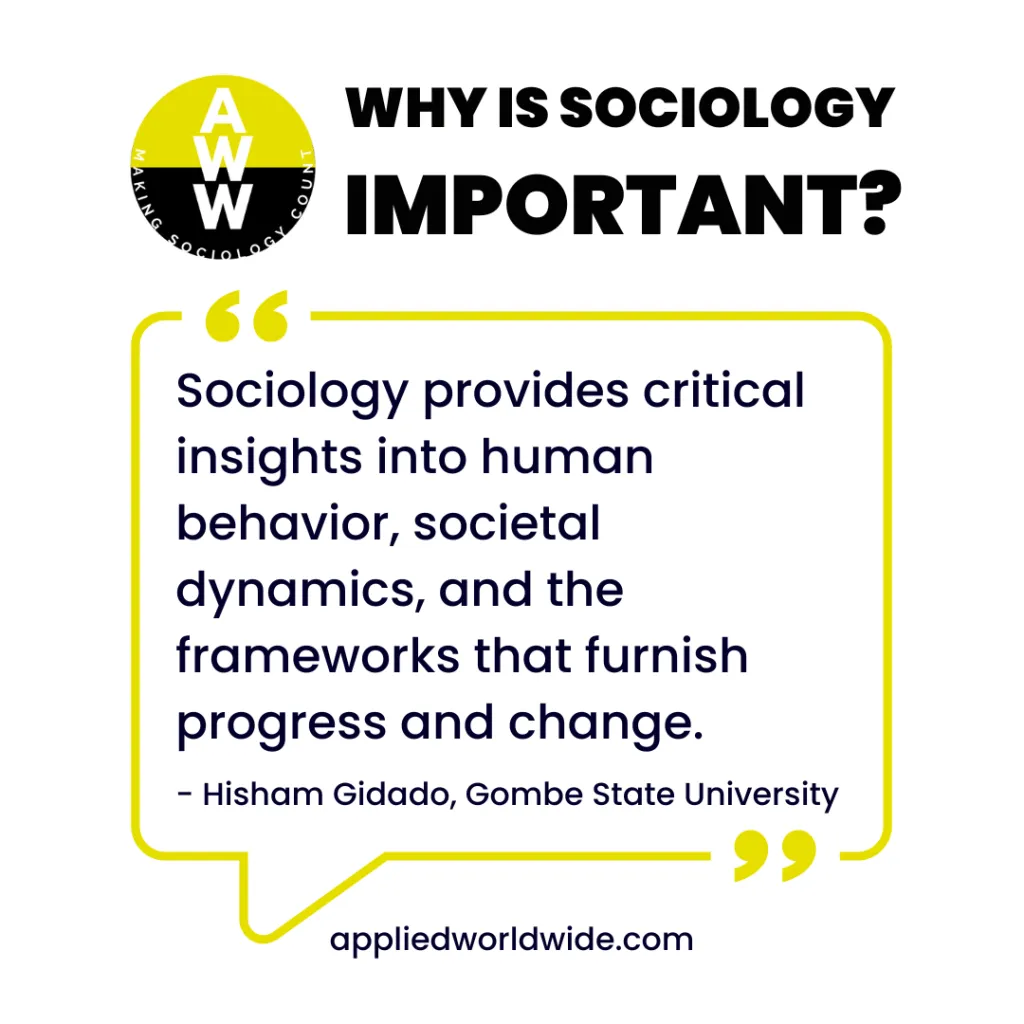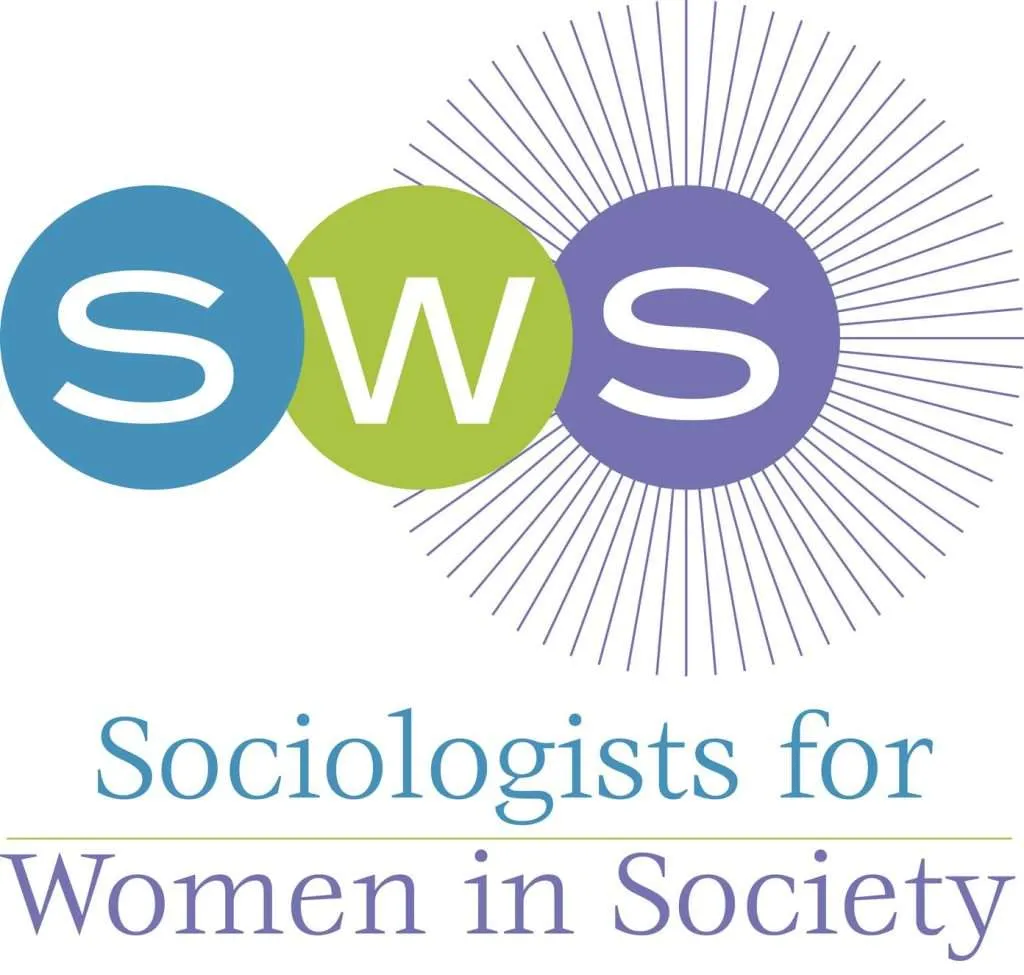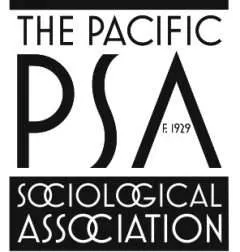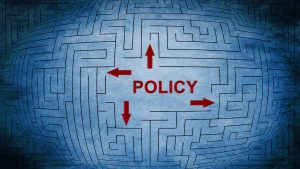Editorial Note
Thank you to our generous sponsors, Sociologists for Women in Society, Center for Equity Education, American Sociological Association’s Section on Sociological Practice & Public Sociology, Hartman Castle Preservation Corporation, Island Acres Resort Motel, Alpha Kappa Delta, Pacific Sociological Association, and the Association for Applied & Clinical Sociology for helping us make Applied Worldwide’s 2024 “Why is Sociology Important?” student essay competition a success!
This essay on the importance of sociology has been published on behalf of Applied Worldwide’s 2024 Global Student Essay Competition. For the 2024 competition, we awarded 16 student essayists across six countries and will be sharing each winning essay in our “Why is Sociology Important?” essay collection.
This sociology essay was written by Hisham Gidado, a third year LLC Law student from Gombe State University, Nigeria and earned a 3rd place prize in the competition.
Sociology: The Overlooked Key to Social Existential Problems, Hisham Gidado
Prior to the emergence of sociology, human society was without such a structured scientific framework for analysis. Sociology brought about a mechanism that stressed the communal aspect of social relationships, which transfigured the study of human societies to what it currently is. Sociology, which is a study based on scientific methods such as objectivity, empirical observation, and inquiry, seeks to identify the essential ideas that underpin social phenomena.To stress that it’s a force to be reckoned with in humanity and emphasize its immense importance in comprehending and influencing human behavior in social circumstances, Auguste Comte, eloquently compared it to the “religion of humanity.”
From an encompassing perspective, sociology is the study of social life, social change, and the social causes and consequences of human behavior. Sociologists critically study, investigate and examine the structure of human groups, organizations, and the society at large, and how humans interact within these contexts. Despite being one of the most recent social sciences in emergence, the scope of sociology is the most multifaceted of all the disciplines. Owing to the fact that all aspects of human behavior is social, the amplitude of sociology consequently ranges from family relationship to the hostile mob; from organized behaviors to irrational actions; from the divisions of race, gender and social class to the shared beliefs and cultures; and from wars to sports etcetera. It applies scientific methodologies, such as empiricism, objectivity, observation, and others, to study these subjects and beyond comprehensively.
In cognizance, questioning the importance of sociology should be more blasphemous than questioning the importance of disciplines as law and medicine. While law only strives to maintain the society’s order and structure, and medicine aims to preserve its health, sociology provides critical insights into human behavior, societal dynamics, and the frameworks that furnish progress and change. Hence, it can be rightly said that the study of sociology is as relevant as studying law and medicine combined. This underscores its significance in aiding the creation of appropriate laws to maintain the structure of the society and in fostering avenues for diagnosing the complex ailments of the society.
Thus, due to the wide-ranging scope and relevance of the esteemed discipline of sociology in examining the society, it should be an apt vanguard in the quest to surmount the stumbling blocks of our time, especially in a society like Nigeria.
The Sociological Approach to Social Problems
Sociology employed methods such as conflict theory and systems activism to appropriately understand that social issues often originate within society. C. Wright Mills (1959) argued that social problems stem the organizational structure of the society. His view led to the coinage of the concept of “socialism,” which argued that every problem has it roots in the society, and that it’s not just an individual cases. So, sociology looks in depth and helps us understand social problems, whereas non-sociological approaches rely on the problems.
Applying the social psychology theory to Nigeria, as a country threatened by social evils such as terrorism, inequality and of course corruption, gives the wrong impression that these issues are purely personal problems for nothing or the fault of a few bad actors is exposed. Instead, we can rightly appreciate that there is considerable interference in the social structure of Nigeria resulting from historical, political, economic and cultural factors for example, economic disparity and the marginalization of certain political groups can has incited terrorism. Inequality can be perpetuated through policies of systemic bias and discrimination. Corruption can also be linked to power structures and institutional weaknesses. Judiciously applying the concept of social theory allows us to see beyond seemingly shallow explanations and hypotheses based on effects rather than causes, and to understand the connections between social problems and the social structures that span the line.

The Paradigms of Sociology: Catalysts for Social Change
The paradigms of sociology such as structural functionalism, conflict theory, and symbolic interactionism—are cornerstones of sociological theory, and thus provide in-depth philosophical explanations of social problems and consider solutions to will be used to. These models are philosophical and theoretical frameworks used in sociology to formulate theories and experiments that are conducted to support their assertions. They also analyze the same social problems in different manners. When combined, their perspectives provide a more complete understanding of social issues, revealing a bigger picture.
Conflict theory
This was birthed by the works of Karl Marx, who analyzed society through the lens of struggle for power between different social groups. Applying it in the Nigerian context, it explains the contribution of power dynamics to social problems such as terrorism, corruption and inequality. For instance, the emergence of Boko Haram and the Biafran war have lineage to the perceived social injustice and economic inequality by various social groups. As noted by a Nigerian political analyst Bala Yunusa, “Boko Haram comes from marginalized communities who feel neglected by the government.”
The theory therefore offers a way to curtail some of the social menaces by advocating structural changes from the root causes of problems. Rather than addressing only superficial factors by increasing security measures to combat terrorism or anti-corruption campaigns in which the Nigerian government has been investing billions to no avail, conflict theory recommends readjusting the underlying power imbalances and systemic injustices. As such,a more united and peaceful Nigeria can be achieved In a whirlwind.
Structural Functionalism
Structural Functionalism: Structural functionalism sees society as a system with different parts working interdependently to maintain stability and cohesion. A human body is an epitome of this, suggesting that if any part is injured, the entire body is affected. For instance, having a corrupt executive institution, would undeniably affect the efficacy of judiciary and the parliament, consequently undermining the rule of law, leading to a corrupt and compromised system of justice, which fuels the commission of all kinds of crimes and illegal acts in the larger society
In implementing systemic interventions to address issues such as corruption, terrorism and gender-based violence in Nigeria, one must understand how these issues affect and contribute to the smooth functioning of key civil society. While corruption undermines the efforts of institutions such as the judiciary and parliament, terrorism destabilizes social structures and undermines trust in government, gender-based violence undermines communities unity and equality. This is just as a human body being stroke at the various organs by various deadly diseases.
Therefore, by employing such approach, it could serve as a framework in formulating befitting social laws and policies in cognizance of the root causes and by strengthening the institutions via promoting transparency and accountability. Hence, avenue for Implementation of policies that aid reformation and promotion of social institutions, equitable distribution of resources, as well as social inclusion, is made. And as such, social stability could be restored and unity among Nigeria’s diverse population could fostered, ultimately leading to a more cohesive society that’s sustainably developed
Symbolic Interactionism
This theory is concerned with human interactions and how individuals interpret or make meaning out of such interactions consciously or otherwise. The relevance of this theory could be seen in the instance of how In Nigeria, corruption, gender based discrimination has been unconsciously or subconsciously normalized in the course of everyday interactions. This consequently created a society where immorality is tolerated. As a Nigerian critic Chinweiju Ibekwe put it, corruption has become so ingrained in Nigerian society that it is often seen as a way of life. The assertion could be justify the the significance of interaction and behavior in harnessing social vices, which in deed is the focus of the this theory.
Via the lens of symbolic interactionism in addressing social problems has to do with recognizing the role of social interactions in moulding individual’s perceptions and behaviors. Just as corruption becomes normalized through the course day to day interactions, so too can attitudes and behaviors related to terrorism or gender-based violence. Interventions using symbolic interactionism can focus on reconstructing the meanings associated with these behaviors, challenging the social norms that perpetuate them, and they promote a new identity that emphasizes integrity, peace, and gender equality through targeted education, community engagement, and grassroots initiatives. of the meanings of the associated symbols . It redefines society, ultimately leading to positive social change and an inclusive society.
Critical Theory
Critical theory focuses on critiquing the existing unjust power structures and advocating for structural changes to bring about sustainable solutions that harness vices such as inequalities perpetuated by corruption and discrimination etcetera. The relevance of this theory can not be overemphasized, in Nigeria for instance, critical theory can guide efforts to dismantle corrupt systems and promote social justice. As Nnimmo Bassey, a Nigerian environmental activist, rightly said, “corruption in Nigeria is not just a matter of individuals engaging in unethical behavior; it is a systemic problem rooted in the unequal distribution of power and resources.”
Therefore, critical theory provides a structured framework for figuring out solutions to systemic issues such as corruption and terrorism in Nigeria by advocating for structural changes that promote social justice and equality. Challenging the power dynamics and advocating for systemic reform, critical theory offers avenues towards sustainable social development. For instance, as implied by the theory, addressing the root causes of corruption requires more than just punishing individual wrongdoers; it necessitates institutional reforms which would increase transparency, accountability, and citizen participation. Similarly, tackling terrorism requires addressing the underlying grievances and socioeconomic disparities that fuel extremist ideologies. Critical theory advocates for inclusive policies that address the root causes of marginalization and inequality, thereby reducing the appeal of extremist groups like Boko Haram. By promoting social development through systemic reform and addressing the structural roots of corruption and terrorism, critical theory offers a holistic approach to fostering a more just and equitable society in Nigeria.
Feminist Theory
This theory directs more attention on how gender and different social issues are intertwined, emphasizing the challenges women face. Women are more likely to bear the disproportionate impacts of social problems such as terrorism, corruption and inequality in Nigeria. Many reports highlight that women and girls in Nigeria are particularly vulnerable to violence and gender-based discrimination. More so, as a Nigerian writer and feminist Chimamanda Ngozi Adichie asserts,”Feminism is not about making women stronger; women are already strong. It is about changing the way the world perceives that strength.” By centering on women’s experiences and perspectives, feminist theory contributes to building a more inclusive society and proposes effective solutions to Nigeria’s social problems.
Hence, via the observations proffered by the sociological theory of feminism, the government can implement policies aimed at safeguarding the rights of women and prevention of gender-based violence and discrimination which counts among the major problems of the state.
Conclusion
Sociology, being a vast discipline with its scope resting on diverse subjects, offers insights and strategies for addressing the challenges faced by the Nigerian society. Employing the use of sociology theories such as conflict theory, structural functionalism, symbolic interactionism, critical theory, and feminist theory, makes policymakers and stakeholders gain wholesome understandings of the deep-rooted causes of prevailing issues ravaging our country like corruption, terrorism, and gender-based violence. These theories provide structures for analyzing our societal problems and also formulate solutions that aid in addressing underlying structural inequalities and power dynamics. When we fully embrace the sociological imagination and engage with various views, Nigeria as a nation can strive to build a more just, equitable and all inclusive society, where everyone’s right is respected. A nation where development is promoted and where sustainability and social cohesion are given top most priority.
References:
- Lumen Learning. (n.d.). The main sociological theories | Introduction to Sociology. https://courses.lumenlearning.com/wm-introductiontosociology/chapter/reading-theoretical-perspectives/#:~:text=Three%20paradigms%20have%20come%20to,conflict%20theory%2C%20and%20symbolic%20interactionism.
- Oluwamuyiwa, A. (2015, January 28). Chinweizu: Nigerians and their anti-corruption charade. The Guardian Nigeria News – Nigeria and World News. https://guardian.ng/opinion/columnists/chinweizu-nigerians-and-their-anti-corruption-charade/amp/
- Sociological perspectives on social problems | Social problems. (n.d.). https://courses.lumenlearning.com/suny-socialproblems/chapter/1-2-sociological-perspectives-on-social-problems/
- Applied Worldwide. (2023c, November 3). Why is Sociology Important? The Cornerstone of the Social Sciences. https://appliedworldwide.com/why-is-sociology-important-the-cornerstone-of-the-social-sciences/
- Gidado, H. S. (2023b, November 29). Sociology and Social Problems of our Society in Nigeria. Applied Worldwide. https://appliedworldwide.com/sociology-and-social-problems-of-our-society-in-nigeria/
Meet our 2023 Global Student Essay Competition Sponsors!

Sociologists for Women in Society is a nonprofit professional feminist organization dedicated to:
- Transforming the academy and professional organizations, including our own, by actively supporting feminist leadership and advancing career development of feminist scholars.
- Recognizing that structural inequalities impact those marginalized by their identities and that this requires proactively promoting the creation of inclusive institutional spaces in an ongoing manner and by practicing critical reflexivity.
- Advocating and encouraging the development of sociological feminist theory rooted in intersectionality and cutting-edge research for publication and dissemination.
- Promoting social justice research within local, national, and international activist spaces by supporting scholar-activist communities seeking to dismantle intersecting systems of oppression.

The Center for Equity Education (CFEE), established in 2020 as a 501(c)(3) nonprofit, addresses a gap in expert-led education for organizations, especially those with limited resources. At CFEE, our mission revolves around empowering organizations with comprehensive knowledge on federal and state civil rights, specializing in harassment and discrimination, including sexual harassment.

Hartman Castle Preservation Corporation, a 501c3 non-profit, is a A community grassroots movement formed to purchase and preserve the Hartman Castle in Gunnison, CO

The purpose of the American Sociological Association’s Section on Sociological Practice and Public Sociology is to advance sociologically-informed research and practice, to further public discussion of sociological issues, and to promote the use of sociology to inform public policy.

Island Acres Resort Motel is a restored authentic 1950s lodging property in the style of the tourist court motel. Embracing the appeal of a bygone era, where history blends with hospitality.

Alpha Kappa Delta, the International Sociology Honor Society, seeks to acknowledge and promote excellence in the scholarship in the study of social problems, sociology, and intellectual activities that lead to the improvement in the human condition.

The Pacific Sociological Association is committed to serving sociologists, faculty, applied professionals, and students. We strive to create a professional community that reflects the diversity of our region and enhances the diversity of our discipline. We are committed to inclusivity and equity in our organization, to promoting social justice by examining and challenging the structural and institutional barriers in our discipline, and to building pathways for the next generation of sociologists.

The Association for Applied and Clinical Sociology (AACS) promotes applying social scientific knowledge and methods to develop constructive solutions. We provide educational, programmatic, mentoring, networking, and policy resources in a supportive professional community.







